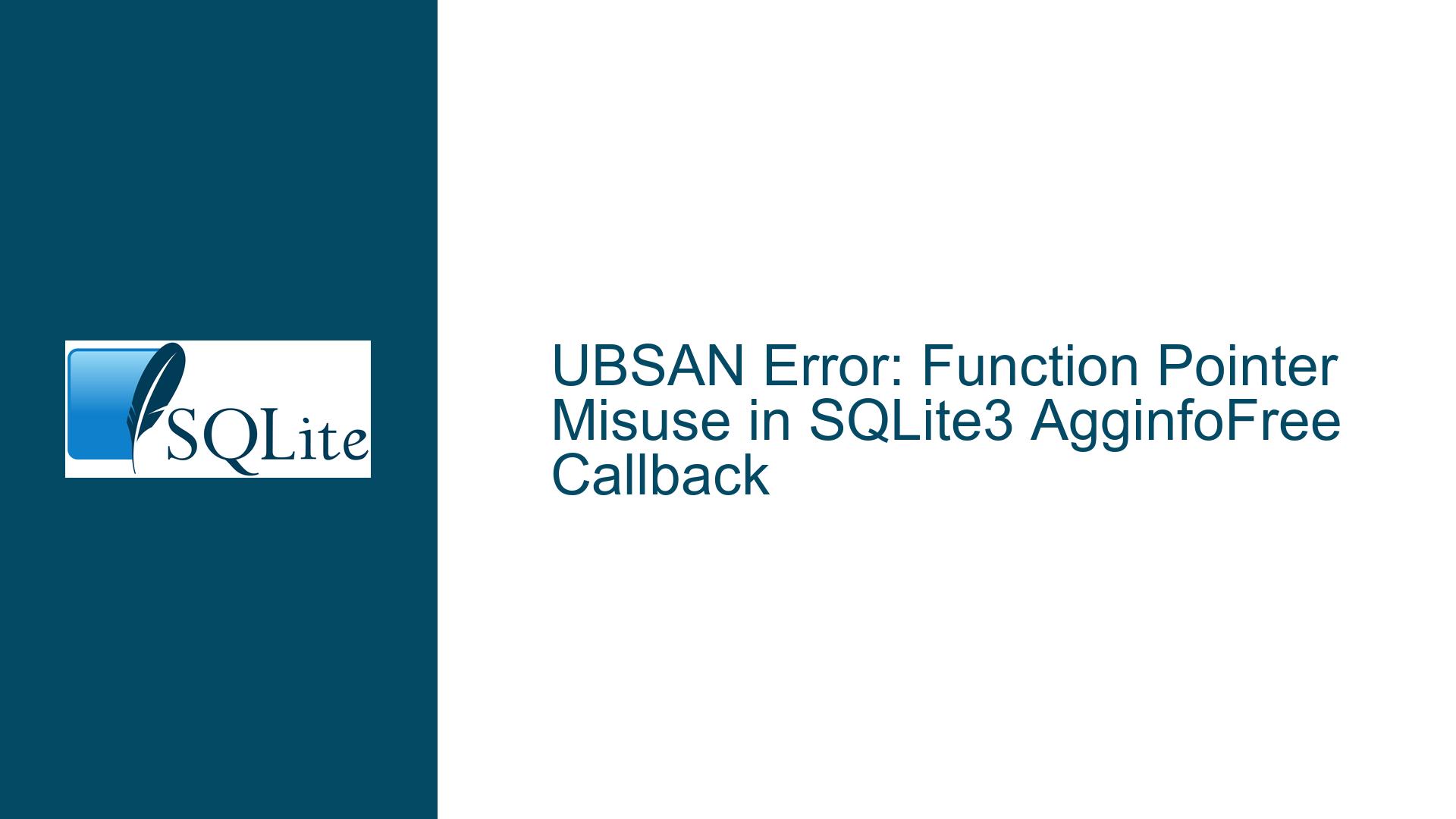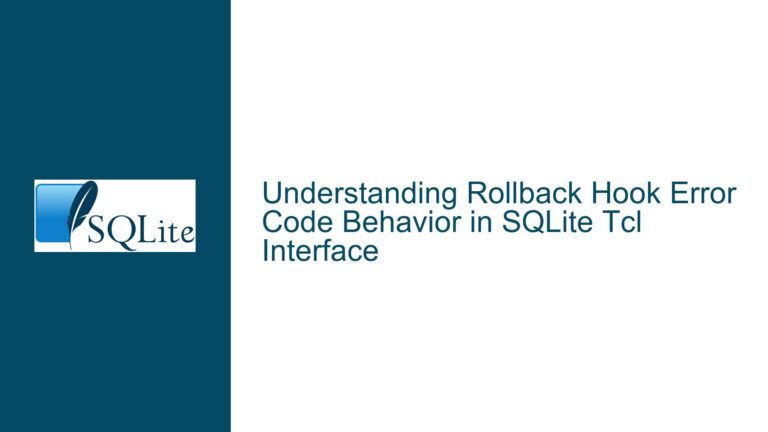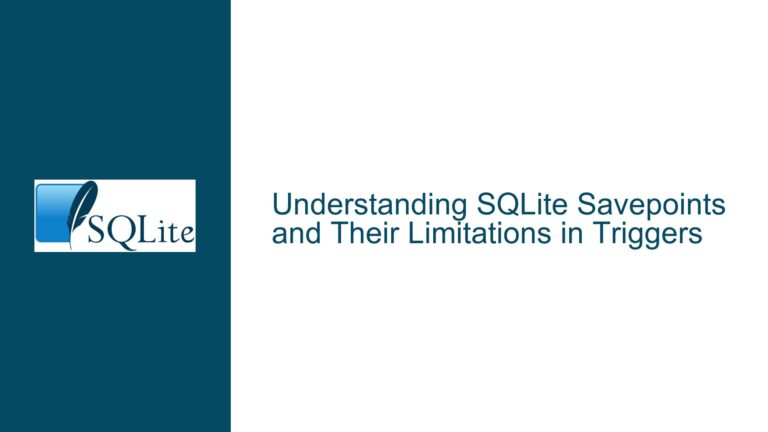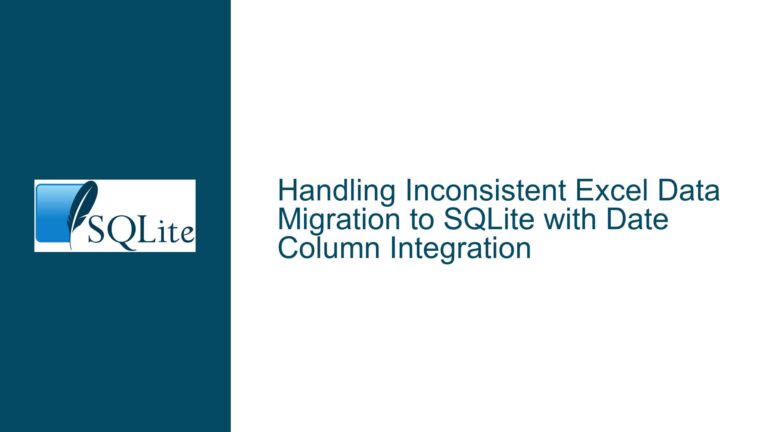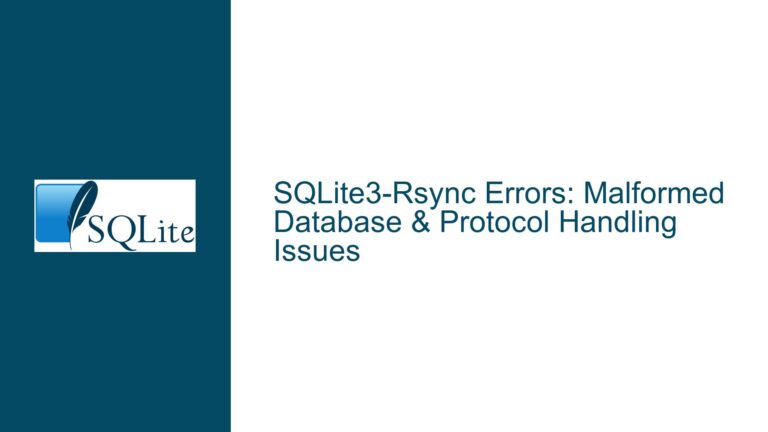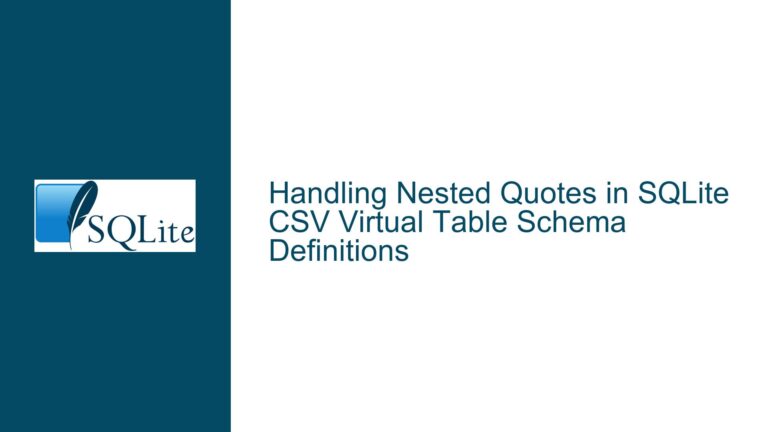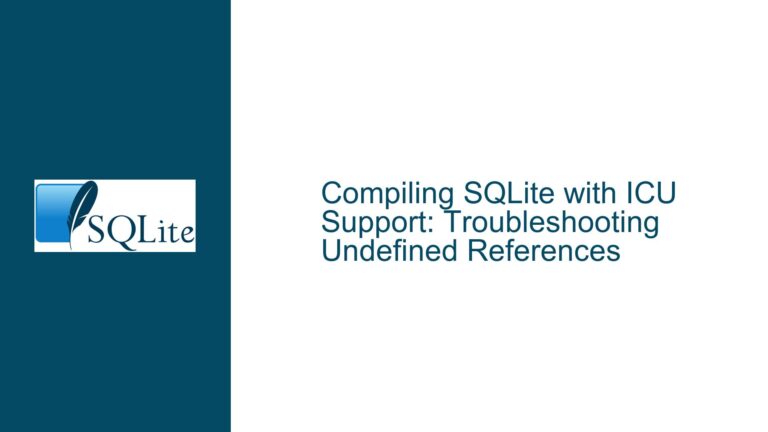UBSAN Error: Function Pointer Misuse in SQLite3 AgginfoFree Callback
Issue Overview: UBSAN Runtime Error Due to Function Pointer Type Mismatch
The core issue revolves around a runtime error reported by the Undefined Behavior Sanitizer (UBSAN) in LLVM 17. The error occurs when SQLite3 attempts to call the agginfoFree function through a function pointer with an incorrect type signature. Specifically, the function pointer is cast to void (*)(sqlite3*, void*), which does not match the actual signature of agginfoFree. This mismatch triggers UBSAN, as it violates the C standard’s rules on function pointer compatibility, leading to undefined behavior.
The problematic code is found in the select.c file of SQLite3, where agginfoFree is registered as a cleanup callback using sqlite3ParserAddCleanup. The function is designed to deallocate an AggInfo object, which is used in the processing of SQL SELECT statements involving aggregate functions. The current implementation casts agginfoFree to a generic function pointer type to accommodate the callback registration mechanism, but this approach is technically undefined behavior according to the C standard.
The error message highlights the specific line in the SQLite3 source code where the issue occurs:
../../../../distro/sqlite3.c:138858:5: runtime error: call to function agginfoFree through pointer to incorrect function type 'void (*)(struct sqlite3 *, void *)'
This error is not merely a theoretical concern. While it may not cause immediate issues on most platforms, it becomes a significant problem when SQLite is built with Control Flow Integrity (CFI) or similar security mechanisms. CFI enforces strict type checking on function pointers to prevent exploits, and the current implementation would fail under such conditions.
Possible Causes: Undefined Behavior in Function Pointer Casting and Callback Registration
The root cause of this issue lies in the misuse of function pointer casting in the SQLite3 codebase. Function pointers in C are highly type-specific, and casting them to incompatible types is considered undefined behavior. The C standard explicitly states that calling a function through a pointer of an incompatible type leads to undefined behavior, even if the underlying function’s implementation could theoretically handle the call.
In the case of agginfoFree, the function is defined with the following signature:
static void agginfoFree(sqlite3 *db, AggInfo *p);
However, the callback registration mechanism in sqlite3ParserAddCleanup expects a function pointer of type void (*)(sqlite3*, void*). To bridge this gap, the SQLite3 codebase uses an explicit cast:
(void(*)(sqlite3*,void*))agginfoFree
This cast is problematic for several reasons. First, it violates the C standard’s rules on function pointer compatibility. Second, it introduces a potential runtime error when the function is called through the mismatched pointer. Third, it can cause issues with advanced compiler features like CFI, which rely on strict adherence to function pointer types for security and correctness.
Another contributing factor is the design of the callback registration mechanism itself. The sqlite3ParserAddCleanup function is designed to accept a generic cleanup callback with a fixed signature, but the actual cleanup functions (like agginfoFree) often have specific signatures tailored to their tasks. This mismatch necessitates the use of casts, which are inherently unsafe.
Additionally, the discussion mentions the use of dlsym as a comparison point. While dlsym also involves casting function pointers, it operates under different constraints and is explicitly allowed by POSIX and Windows APIs. This distinction is important because it highlights the difference between platform-specific allowances and the strict requirements of the C standard.
Troubleshooting Steps, Solutions & Fixes: Resolving Function Pointer Misuse in SQLite3
To address this issue, the SQLite3 codebase needs to eliminate the undefined behavior caused by function pointer casting. The solution involves modifying the agginfoFree function and similar cleanup functions to match the expected callback signature, thereby removing the need for unsafe casts. Here’s a detailed breakdown of the steps and fixes:
Step 1: Modify the Function Signature
The first step is to change the signature of agginfoFree to match the expected callback type. Instead of accepting an AggInfo* as its second argument, the function should accept a void* and perform an internal cast to the correct type. This approach ensures that the function pointer can be registered without requiring an unsafe cast.
The modified function would look like this:
static void agginfoFree(sqlite3 *db, void *vp) {
AggInfo *p = (AggInfo*)vp;
sqlite3DbFree(db, p->aCol);
sqlite3DbFree(db, p->aFunc);
sqlite3DbFreeNN(db, p);
}
This change preserves the original functionality while aligning the function signature with the callback requirements.
Step 2: Update Callback Registration
With the modified function signature, the callback registration no longer requires an unsafe cast. The call to sqlite3ParserAddCleanup can be updated as follows:
sqlite3ParserAddCleanup(pParse, agginfoFree, pAggInfo);
This change eliminates the undefined behavior and ensures that the function pointer is used correctly.
Step 3: Apply Similar Fixes to Other Cleanup Functions
The same approach should be applied to all other functions used with sqlite3ParserAddCleanup. Each cleanup function should be modified to accept a void* argument and perform an internal cast to the appropriate type. For example:
static void otherCleanupFunction(sqlite3 *db, void *vp) {
SpecificType *p = (SpecificType*)vp;
// Perform cleanup operations
}
This ensures consistency across the codebase and eliminates all instances of undefined behavior related to function pointer casting.
Step 4: Test the Changes
After implementing the fixes, the modified code should be thoroughly tested to ensure that it behaves correctly in all scenarios. This includes:
- Running the SQLite3 test suite to verify that the changes do not introduce regressions.
- Testing the code on platforms with strict function pointer enforcement, such as those using CFI.
- Verifying that the cleanup functions operate as intended and do not leak memory or cause crashes.
Step 5: Review and Merge the Fixes
Once the changes have been tested and validated, they should be reviewed by the SQLite3 development team and merged into the main codebase. This ensures that the fixes are available to all users and prevents similar issues from arising in the future.
Additional Considerations
While the proposed fixes resolve the immediate issue, it’s worth considering broader improvements to the callback registration mechanism. For example, the sqlite3ParserAddCleanup function could be redesigned to accept a more flexible callback type, reducing the need for function pointer casting. However, such changes would require careful evaluation to avoid introducing new complexities or breaking existing code.
In conclusion, the UBSAN error in SQLite3 is a result of undefined behavior caused by function pointer casting. By modifying the affected functions and updating the callback registration mechanism, this issue can be resolved in a way that is both standards-compliant and robust against future challenges.
